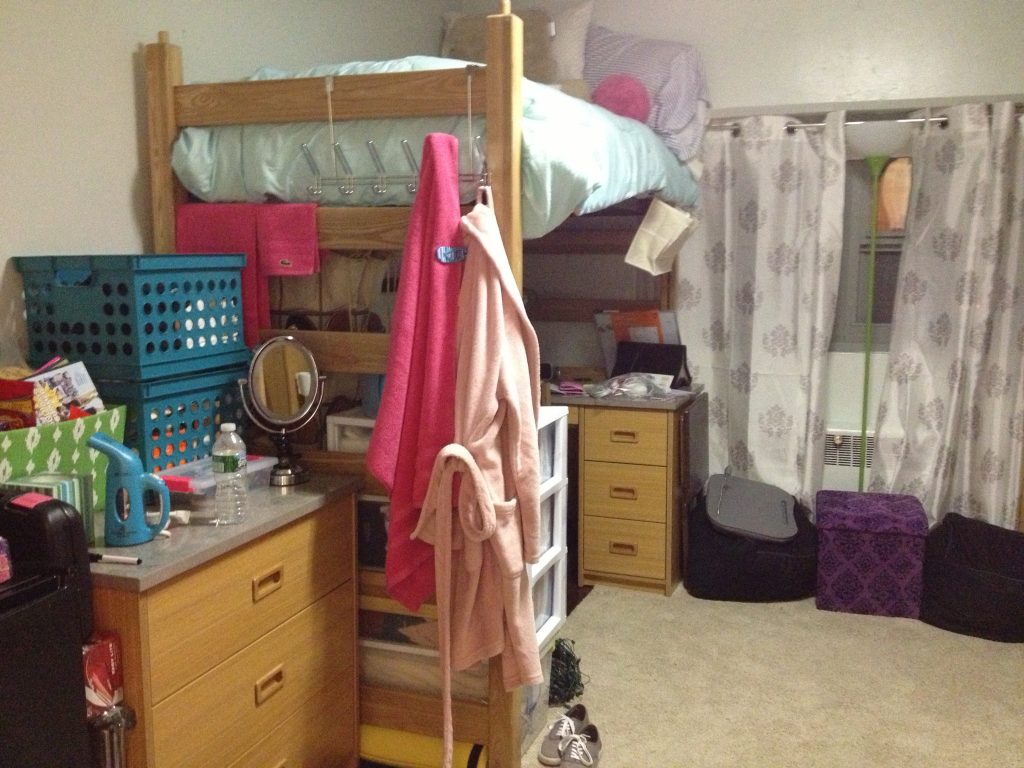We-Ha.com will be publishing a series of essays/blogs/reflections on the issue of going to college – primarily a set of thoughts and musings, along with some practical advice, intended to support students and parents as they embark on this journey. While many of our readers are experts in this topic, many others are less knowledgeable and have little outside support. We hope this is helpful to all readers as they go through the various stages of getting into and getting something out of college.

Adrienne Leinwand Maslin. Courtesy photo (we-ha.com file photo)
By Adrienne Leinwand Maslin
You worked hard for this. You studied. You took exams. Maybe you had a part-time job to save money. You participated in extracurriculars. Chorus, volleyball, engineering club! And, now, here you are at college.
You are standing in a room that is about 130 square feet. Despite its small size there are two naked beds, two bureaus, two desks, two chairs, and two closets. Perhaps your parents are with you. And a younger sibling, too. And you are surrounded by all your stuff. Nearly all your belongings have been transported to this magical place that you’ve been dreaming of for years, in rolling duffels, suitcases, and plastic trash bags.
Smoosh, the stuffed cow that has been by your side since birth, dangles precariously from a laundry basket filled with your just-purchased sheets, comforter, and towels. You turn around, if you can, and take in the confines of this tiny room, your home for the next nine months. You wonder which bed to choose, whether you’ll like your roommate, where you’ll put all your things, whether you’ll get lost on campus, if you packed your phone charger, whether you’ll miss gentle Axel and big-boy Shep more than you imagined. You overhear another freshman who will be taking “Calc 3” and you realize you didn’t even take Calculus 1. Suddenly, you feel … overwhelmed, scared, lost.

College dorm room. Photo credit: Ronni Newton
Some students breeze through college. If not academically, then emotionally. For others, the strangeness of a new room, bed, roommate, shared bathroom, dining hall, classes, and professors is enough to make them want to hop the next airplane, train, or Uber and get home. Feelings of loneliness and unease affect students of all genders, races, and ethnicities. So what do you do?
First, it’s important to recognize that you are not the only student feeling this way. Many people, of all ages, who find themselves in unfamiliar surroundings feel overwhelmed and homesick. According to the 2020 Your First College Year Survey, administered by the Higher Education Research Institute which operates out of the University of California Los Angeles, about 62% of students reported feeling homesick during their freshman year.
The trick, however, is not to let these feelings dominate your life. If you are intent on making the most of your college education, then you have to make the decision to do what you can to overcome the feelings of doubt and loneliness. It may not be easy but the alternatives – returning home or hiding in your dorm room – are not very appealing. My suggestion is to put on the jeans, t-shirt, and flip-flops that make you feel like your best self, take a look in the mirror and smile, and get out of your room. Walk down the hall and if there is an open door and a person inside, stick your head in and say “hi.” Ask the occupant if they would like to grab a cup of coffee or take a walk and explore campus. If they say “yes,” then head out together and get to know each other. If they say “no,” just say you’ll catch up with them later and head out on your own. Do not take it personally!
Your college will have a place that is called the Student Center or Campus Center, although it could have another name as well. Usually, this building has places to grab a snack, perhaps play a game of pool or air hockey, and an office for student activities where you can ask about clubs and other activities and events for students. This would be a good place to start. What do you like to do? Sing in the choir? Lift weights? Go hiking? There are most likely clubs for all of these things and more. Get your name on a mailing list and when an activity takes place, participate.
Of course, participating in new student orientation is a must. Orientation is to help you feel comfortable, make friends, make you aware of important college policies, become familiar with safety procedures, and learn where to go for what. Attending new student orientation is one of the best things a student can do to get off to a good start at college. One very helpful component of orientation is helping you learn the layout of the campus and help you find where your classes are held.
Becoming familiar with your new surroundings is also a good tactic for easing those feelings of homesickness. When a place is familiar, when you know where the dining halls are; where the campus Starbucks is located; how to find the gym and any procedures your college has for using the locker rooms, swimming pool, or workout room; when you know the best routes from your residence hall to your classes; you will begin to feel more comfortable. As the campus begins to take on a more familiar appearance, those feelings of “newness” will wear off and you will feel more at home.
Be sure to be open to engaging with students who are different from you. Just because a student is of a different racial or ethnic background; looks, in your opinion, like a nerd; uses a wheelchair; wears a hijab; or just doesn’t look like they would belong to your current circle of friends does not mean you shouldn’t take some time to get to know them.
College is to expand your horizons and grow in all aspects of your life: to have your opinions challenged, explore new ideas, learn new skills, and meet new people, among others. The people you meet during your first couple of weeks may not become life long friends. They may not even become friends at all. But it’s nice to see familiar faces when you go to the dining hall or walk into a classroom. And you never know; you may have more in common than you initially think.
Finally, be sure you know who to go to for help if you need it. What you do not want is for your feelings of homesickness and loneliness to be so overwhelming that they interfere with your academic work. So, it is important to get help if you need it.
If you live in a residence hall, you can start with the residence life staff. There is usually a person or several people in your residence hall who live in the hall with you and serve as advisors or assistants. They are trained to be good listeners and these knowledgeable student-staff members can give you some ideas on how to handle your concerns. And, certainly, they can point you in the direction you need to go, whether it is a department office, student activities office, or your college’s counseling center.
If you attend a college without residence halls, or if you do not live on campus, you can visit the dean of students’ office. The staff should be very good at directing you to the right place to get help.
For every student who is feeling some anxiety or trepidation in the social/emotional realm, there is another student who has academic anxiety. Perhaps the student feels like a fraud or an imposter. “Why did this college accept me?” “What if I can’t keep up with my classes?” “What if everyone else is smarter than me?” If this is you, please know that you, too, are not alone. Many students enter college with these anxieties. The first thing to understand is that college admissions offices are pretty adept at knowing the characteristics of students who will succeed at that particular college. So give the staff some credit for recognizing that there was a match between the college and you.
Next, make it a point to know where to get academic help at your college. Most colleges have a tutoring center although it might be called a learning center, help center, etc. There should be no embarrassment about using a tutoring center or getting extra help. One thing I learned long ago is that students who go for extra help are frequently those who are already doing well in their classes and who simply don’t understand a particular concept, want some help with a research paper, or want to acquire some better study habits. Other places to get help, depending on the type of help you need, include your faculty, teaching assistants, librarians*, the computer center, a writing center, math center, or a study group. You or your parents are paying a lot of money for you to succeed in college so take advantage of all the help your college can provide.
Some colleges have organized learning communities. A learning community is a cohort of students who take more than one class together. Frequently the classes taken together have a common theme but not always. In addition to common academic experiences, the learning community frequently will have shared co-curricular activities that are a required part of the learning experience. Joining a learning community, if available at your college, is a good way to make new friends quickly and to have a group of people with whom to form a study group or just to bounce ideas and questions off of.
Please understand that it’s not my purpose to dampen anyone’s excitement and enthusiasm about going to college. And I know many students who did not experience extreme anxiety of any kind during their college years. But I’ve worked with many students whose initial college experience threw them off balance. So, “forewarned is forearmed” as the saying goes. A little thought and preparation can give you an advantage.
And to all of you reading this who are about to enter college this fall, I wish you much success!!
*I put an asterisk next to librarians in order to say a little bit more about them but it didn’t fit into the body of the article. Librarians, both on college campuses and in public libraries throughout the country – and I have been in many of both kinds – are, in my opinion, unsung heroes. While I probably shouldn’t stereotype, I have consistently found librarians to be kind, understanding, helpful, and among the most knowledgeable people on a college campus. They are committed to your success and will do what they can to help you. Get to know at least one librarian at your college. It can make a huge difference.
Adrienne Leinwand Maslin recently retired from a 45-year career in higher education administration. She has worked at public and private institutions, urban and rural, large and small, and two-year and four-year, and is Dean Emerita at Middlesex Community College. She has held positions in admissions, affirmative action, president’s office, human resources, academic affairs, and student affairs. Maslin has a BA from the University of Vermont, an MEd from Boston University, and a PhD from the University of Oregon. She is presently creating a TV/web-based series on life skills and social issues for 9-12 year olds believing that the more familiar youngsters are with important social issues the easier their transition to college and adulthood will be. Information about this series as well as contact information can be found at www.shesroxanne.com.
Like what you see here? Click here to subscribe to We-Ha’s newsletter so you’ll always be in the know about what’s happening in West Hartford! Click the blue button below to become a supporter of We-Ha.com and our efforts to continue producing quality journalism.









[…] College Bound: Your First Semester (WeHa.com, August 21, 2022) […]